New finding on Oxford vaccine as trial continues
A review has revealed just what caused a participant to fall ill during an Oxford University vaccine trial.
Coronavirus
Don't miss out on the headlines from Coronavirus. Followed categories will be added to My News.
- US had COVID-19 cases ‘last year’, bombshell report claims
- Lockdown trend Aussies are going crazy for
Symptoms that prompted Oxford University and partner AstraZeneca to halt possible coronavirus vaccine trials probably weren’t related to the shot itself, according to documents sent to participants.
Safety reviews were undertaken when participants in the Oxford study developed unexplained neurological symptoms including limb weakness or “changed sensation,” a participant information sheet posted online by Oxford University has shown.
“After independent review, these illnesses were either considered unlikely to be associated with the vaccine or there was insufficient evidence to say for certain that the illnesses were or were not related to the vaccine,” the letter reads.
“In each of these cases, after considering the information, the independent reviewers recommended that vaccinations should continue.”
Questions have surrounded a UK volunteer’s illness in the trial and the safety data that triggered the halt. The Oxford-AstraZeneca vaccine study remains on hold in the US pending a regulatory review, federal officials said.
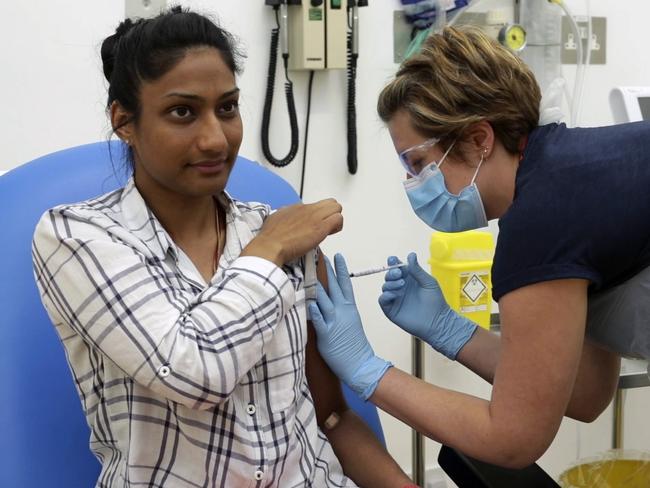
The pause underlines uncertainties researchers face on the road to developing a vaccine. Although temporary halts in such trials aren’t uncommon, the pause in the Oxford study has heightened worries about when the first shots providing protection against the pandemic could be ready.
It comes as trials resumed over the weekend after a patient’s illness was found not to be linked to the jab but it was unlikely to be available before Christmas.
The world’s leading vaccine candidate, along with Germany’s BioNTech jab, still needs another 12,000 volunteers to complete its stage three trial.
Australia has ordered 33 million doses and hoped to roll it out by January, with Britain planning to jab its population before Christmas.
However, those timelines remain under a cloud because trials have only resumed in Britain, with studies in the United States, Brazil and South Africa still on hold.
Oxford University and AstraZeneca, the manufacturer both confirmed on Sunday, that the trial was continuing after it was paused to investigate whether a volunteer had an adverse reaction.
The British-based volunteer was sick, with suspected spinal inflammation, but any link to the vaccine was ruled out.
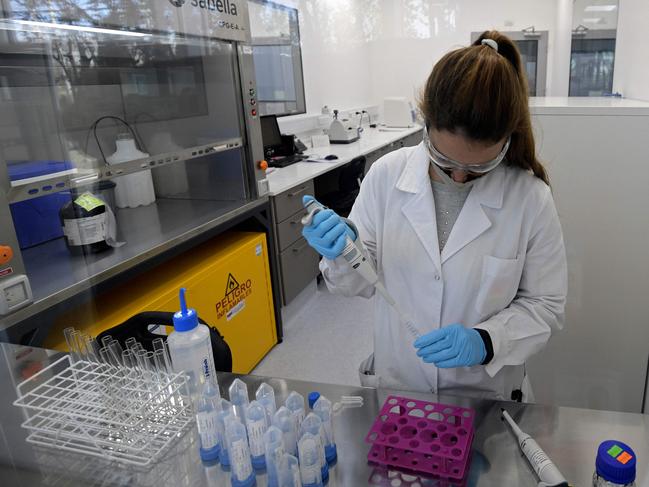
“The ongoing randomised controlled clinical trials of the Oxford coronavirus vaccine ChAdOx1 nCoV-19 will resume across all UK clinical trial sites,” the University of Oxford researchers said in a statement.
“Globally some 18,000 individuals have received study vaccines as part of the trial. In large trials such as this, it is expected that some participants will become unwell and every case must be carefully evaluated to ensure careful assessment of safety.”
The trials were paused when a female British volunteer was taken to hospital on September 6 with an unexplained illness.
Researchers have been cautious and it was the second time it had been stopped.
“The independent review process has concluded and following the recommendations of both the independent safety review committee and the UK regulator, the MHRA (Medicines and Healthcare products Regulatory Agency), the trials will recommence in the UK,” the researchers said.
“We cannot disclose medical information about the illness for reasons of participant confidentiality.
“We are committed to the safety of our participants and the highest standards of conduct in our studies and will continue to monitor safety closely.”
The vaccine candidate, which AstraZeneca called AZD1222, uses a chimpanzee virus based on a version of the common cold with a spike of the coronavirus protein.
The vaccine, which was in development for several years to be used on the Middle Eastern Respiratory Syndrome virus, trains the body to attack the coronavirus protein.
AstraZeneca said in a statement that the trials were safe.
“On 6 September, the standard review process triggered a voluntary pause to vaccination across all global trials to allow review of safety data by independent committees, and international regulators,” the statement said.
“The UK committee has concluded its investigations and recommended to the MHRA that trials in the UK are safe to resume.”
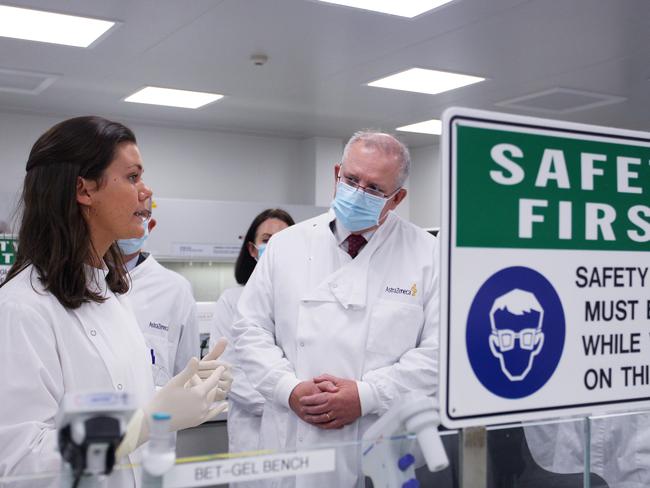
Australia will spend $1.7 billion on the Oxford vaccine and a University of Queensland candidate if they are approved.
The government has ordered 33 million Oxford vaccines and 51 million doses of the UQ vaccine if they work.
They will be made in Melbourne at CSL’s laboratory but the deal included 3.8 million imported doses of the Oxford candidate in January and February if it was signed off.
The Oxford vaccine has shown in stage 2 trials of 1,077 people that it does produce antibodies and a T-Cell response in volunteers, with those who received two doses having a stronger immunity.
China has injected hundreds of thousands of volunteers with experimental vaccines before standard trials were completed, drawing criticism from scientists.
Russia drew similar rebukes after it approved its Sputnik V vaccine before trials were completed.
TRIALS PARTICPANT’S WARNING
It comes as a participant in the paused Oxford University vaccine trial warned that social distancing may be needed until the middle of next year.
Jack Sommers, who was jabbed with the groundbreaking vaccine candidate, said he had always thought timelines for the rollout were optimistic.
He said the thorough checks he was subjected to in the trial were always likely to lead to delays in its approval.
Mr Sommers, who lives in London, said that the Oxford researchers would not rush the trial.
“I’m not really surprised, they sent us an email to tell us this was normal. Someone had fallen ill and they email us all the time reminding you to tell them to remember to tell them if you go to hospital,” he told News Corp Australia.
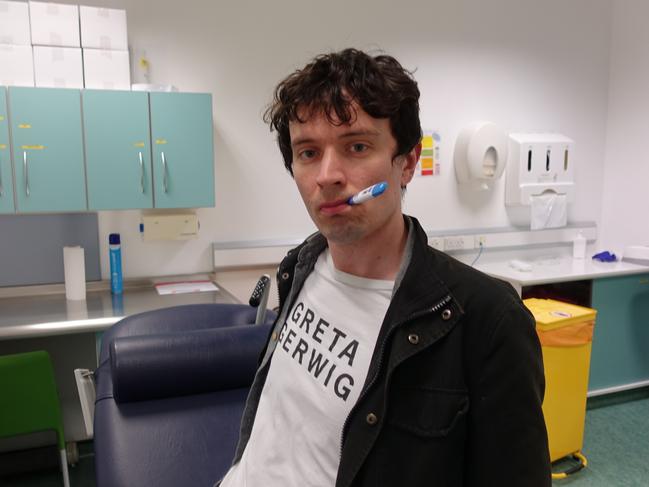
He said that the stage 3 trial included a wider group of people, including those in an older or at risk category, which increased the chances of them being hospitalised for any reason.
“There’s 18,000 people in the trial and it’s not to be unexpected that someone would go to hospital,” he said.
The study stopped enrolling new volunteers this week while it examines why someone involved in the stage 3 trial was hospitalised.
It was the second time that the trial, which now has 18,000 of the required 30,000 volunteers, was paused.
Health Minister Greg Hunt, who has signed a deal for 25 million doses, had hoped to roll out the vaccine in January, while Britain’s Health Secretary Matt Hancock had said it could be approved before Christmas until this week’s setback.
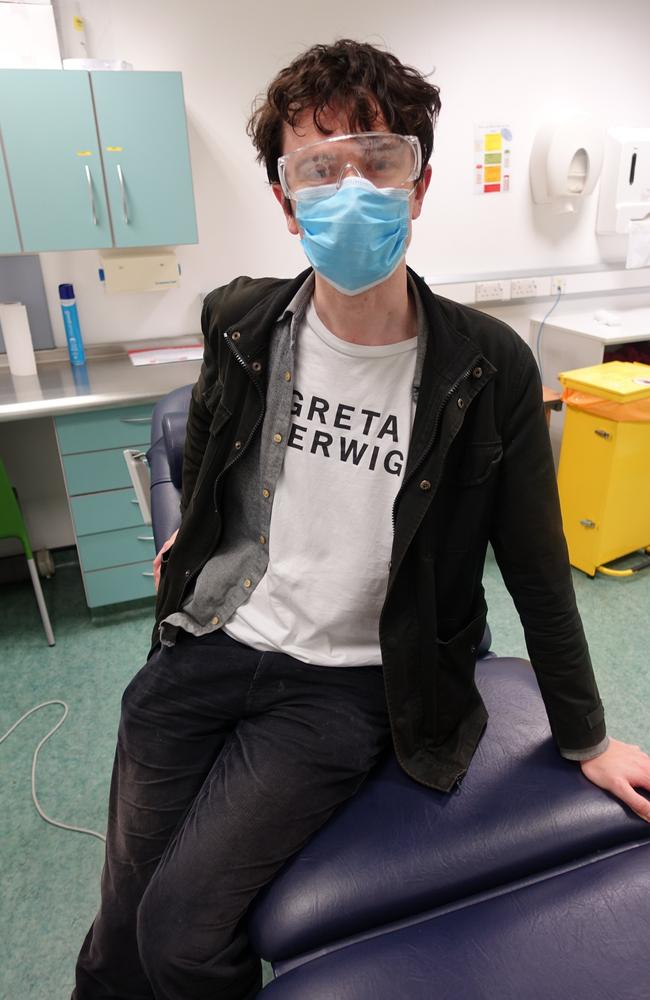
Doctors are now investigating whether the adverse reaction, reportedly a spinal inflammation, was caused by the vaccine or was pre-existing.
Mr Sommers was included in the first and second stage of the trial of 1077 people, which reported in late July that the vaccine had produced antibodies and the crucial T-cell response in volunteers.
It also found that those who received a booster shot had stronger immunity – meaning that it could require two doses if approved.
Mr Sommers, 35, had a sore arm, similar to any normal vaccine, and did not record a high temperature or any other side effects.
He was screened at St George’s Hospital in Tooting, south London, and has provided blood samples.
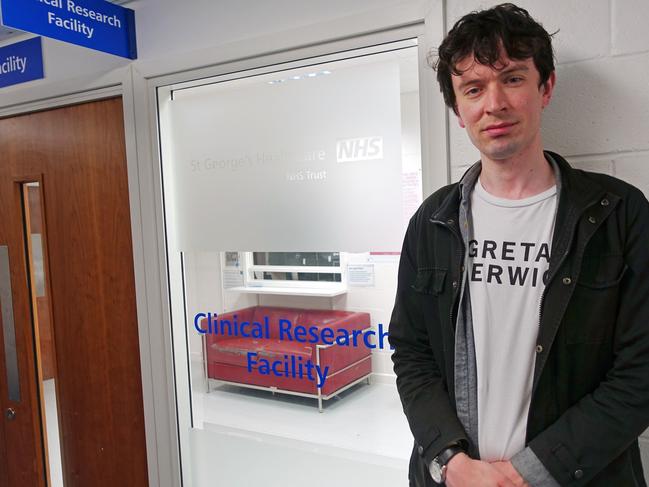
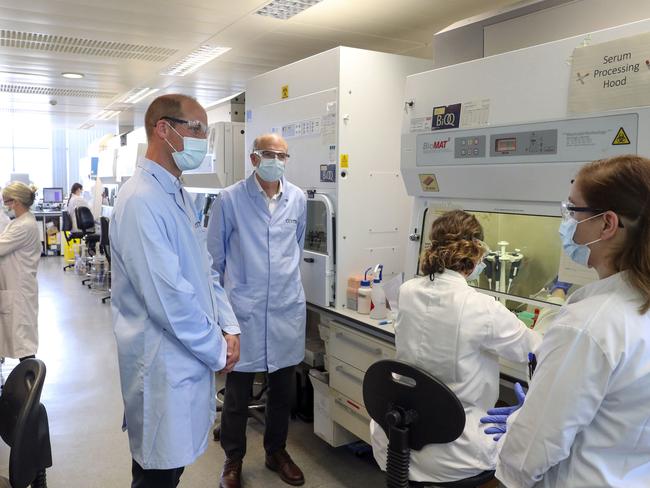
Medical staff have requested that he return for an appointment in November to give another sample.
He said that the original timelines of a vaccine by September were ambitious.
“I gave a blood sample each time and I will know eventually whether I had the placebo. The predictions of it coming in really early sounded optimistic. I thought there was no way it would be ready by September,” he said.
He warned that it may be until the middle of next year before social distancing rules, including testing temperature on entry to restaurants, could be eased.
“I think we will be doing that until next (English) summer,” he said.
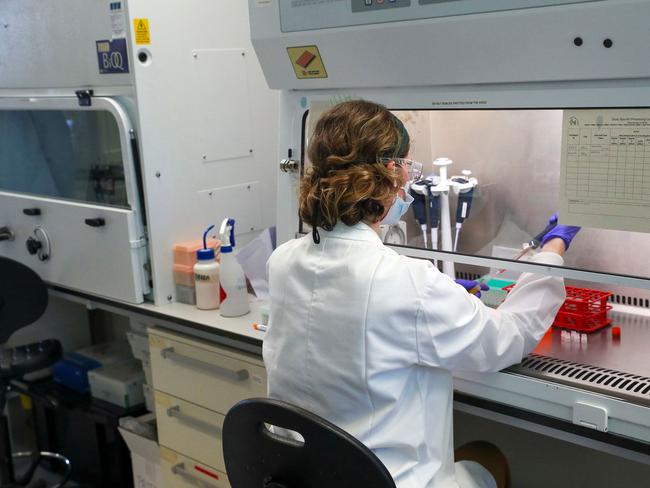
Oxford scientists have been cautious with the roll out of the vaccine, even though United States president Donald Trump had been pushing for it to be approved ahead of the federal election on November 3.
British medical plants were due to take receipt of the vaccine by this week, where it would be filled and ready to be shipped to health services if it was approved.
The vaccine will be produced in Australia by CSL following a deal with its manufacturer AstraZeneca.
The company said in a statement: “This is a routine action which has to happen whenever there is a potentially unexplained illness in one of the trials, while it is investigated.”
stephen.drill@news.co.uk
– with staff writers
Originally published as New finding on Oxford vaccine as trial continues

